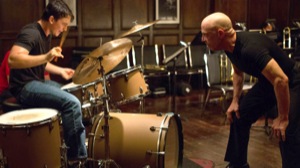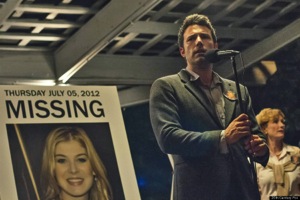
Whiplash
It’s hard to imagine a teacher worse than Terrence Fletcher, the jazz band leader at fictional Shaffer Conservatory of Music in New York who J.K. Simmons plays with terrifying, unpredictable, sadistic joy. Fletcher, something like a cross between a Sgt. Hartman in Full Metal Jacket and Delores Umbridge in Harry Potter and the Order of the Phoenix; foul-mouthed at times, falsely sweet at others, seemingly doing it all for good reasons, but quite possibly psychopathic. The student musicians allow him to reign over them like a mad king because he gets results, brilliant performances, competition wins, and eventually, jobs with major bands and orchestras. Whiplash is the story of what happens when Fletcher adds promising, young jazz drummer Andrew to the band and decides to torture him in order to make him great. It’s a weirdly discomfiting movie, because it does a better job of justifying torture than Zero Dark Thirty does. But like that brilliant thriller, Whiplash is also an extraordinary piece of filmmaking.
Miles Teller, the preternaturally talented star of The Spectacular Now and the upcoming Fantastic Four remake, plays 19-year-old Andrew, whose drumming practice opens the film. Fletcher suddenly appears and asks Andrew if he knows who he is. Yes, he replies. Then you know I’m looking for players, Fletcher counters. Suddenly, Andrew is auditioning, but for less than 15 seconds before Fletcher turns and leaves, only returning to pick up his jacket. Andrew is confused and crushed, and this is when I would say, “Screw it; this guy’s an ass.” But instead, it makes Andrew even more determined. He starts practicing and practicing, giving himself bloody blisters and unhealthy exhaustion. One day, Fletcher walks into the practice session of the lesser band Andrew was assigned to, and after playing 15 seconds of double-time swing, Andrew is asked to join Fletcher’s band.
On the first day, Andrew discovers just how unpredictable, terrifying and cruel Fletcher is when the band leader ejects a trombone player for thinking he was playing out of tune (but wasn’t) and then throwing a chair – a chair! – at Andrew for not playing the right tempo. Simmons, who is one of our better character actors, is clearly in control of Fletcher’s screaming, anger and violence. Simmons has carefully thought through every vocal inflection and threatening movement, just as Fletcher has. Andrew is turned into a musician who thinks nothing is more important that becoming the greatest, meaning that his girlfriend Nicole (Melissa Benoist) just gets in the way. Andrew will do anything; he may become another Fletcher.
Whiplash is essentially a duel film, a jazz version of Face/Off, and the young writer-director Damien Chazelle directs it like a thriller. Instead of guns and fists, Chazelle has drums and horns and a black-clad, sinister band leader. The music scenes are thrilling and intense and occasionally terrifying, particularly when Teller’s Andrew furiously tries to achieve the absurd drumming speed Fletcher wants. Sweat, blood and agonizing facial expressions result, and then Andrew really starts to self-destruct, not only physically but emotionally as well. The plot becomes much less believable toward the end, particularly in the final scene, but the naturalism of the performances and the explosive final musical number keeps the film from going totally tone deaf.
also playing:
Gone Girl
At your local multiplex

David Fincher’s adaptation of Gillian Flynn’s bestselling thriller Gone Girl is suspenseful, creepy and surprisingly funny. In his best performance since Hollywoodland, Ben Affleck plays Nick Dunne, a small town bar owner who comes home to discover his wife missing. Amy Dunne (Rosamund Pike) is beautiful, stand-offish and rich, and they hadn’t been getting along since they left New York to return to Nick’s hometown in Missouri. Amy’s disappearance becomes a national obsession, and the police, led by Detective Rhonda Boney (a wonderful Kim Dickens), suspects a very untrustworthy Nick killed his wife. But so much of the case is weird, and nothing is as it seems. Fincher’s direction is characteristically smooth and taut and he uses Trent Reznor and Atticus Ross’ great score and Jeff Cronenweth’s stunning, murky cinenamography to great effect. The film is long and occasionally absurd, but it’s great fun, particularly after the mad twist in the middle.











